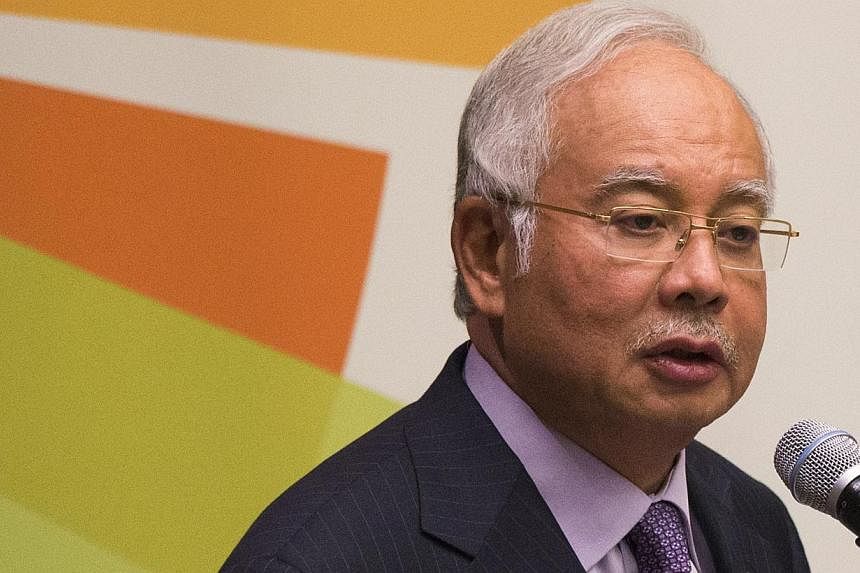KUALA LUMPUR (REUTERS) - Malaysia will unveil a 2015 budget next Friday that investors hope will reduce a fuel subsidy bill that is exacerbating the country's worryingly high debt levels.
Whereas Malaysia's economic growth, which clocked 6.3 per cent in the first half, looks impressive, Prime Minister Najib Razak has to address concerns over the debt burden and an over-reliance on commodity and energy exports.
Government debt stands close to a self-imposed ceiling of 55 per cent of gross domestic product (GDP), and household debt at 86.8 per cent of GDP is the second highest in Asia.
Malaysia is rendered vulnerable to external shocks by foreigners holding 47 per cent of government bonds, and the country has to prepare for an expected rise in U.S. interest rates next year that could put pressure on emerging market economies that have not got their financial houses in order.
Moody's Investors Service raised its outlook on Malaysia's A3 sovereign debt rating to positive following Mr Najib's last budget, when he announced unpopular measures, including a new 6 per cent consumption tax that will take effect in April next year, and cuts to food and fuel subsidies.
But economists say he needs to do more. "What we're looking for is sustainability, not just for the remainder of this administration but also the next administration," said Christian de Guzman, a Singapore-based analyst for Moody's.
A cut in corporate taxes from 25 per cent to 24 per cent, or 20 per cent to 19 per cent for small businesses, is scheduled for 2016, but some analysts suggest the government could either bring it forward or cut more in order to put momentum in private sector investment.
Mr Najib's government currently plans to bring the fiscal deficit down to 3.5 per cent of GDP by the end of this year from 3.9 per cent in 2013, and cut it further to 3.0 per cent by the end of 2015, but there are political complications.
Even though the next election is not due until late 2018, the ruling National Front, led by Mr Najib's United Malay National Organisation (UMNO), is worried that support has ebbed from the ethnic Malay majority. The coalition is dependent on Malays and ethnic groups in Sabah and Sarawak for votes, and has shored up support through subsidies and cash handouts.
Subsidies totaling 38.1 billion ringgit (S$ 14.9 billion) accounted for 15 per cent of government spending this year, with fuel subsidies alone making up 8 percent, or 21 billion ringgit. Having cut the total subsidy bill by 18.4 per cent this year, Mr Najib is expected to cut it further next year by radically reforming fuel subsidies, so they are no longer available to everyone who visits the filling station, but are targeted to benefit the less well off.
Malaysian media reports say the scheme could work through using identification cards at gas stations or via application for subsidised fuel in post offices.
Administered prices for diesel and a cheaper grade of gasoline were increased by up to 10 per cent on Thursday, in a move that will save the government 1.3 billion ringgit this year.
Mr Najib also is expected to announce the full list of items exempted from the new goods and services tax (GST). The government has forecast the GST would bring in 2.5 billion ringgit in revenue in 2015, which analysts reckon would equate to just over one per cent of total revenues.
The government may implement a GST on fuel, a risky move given growing anxiety among voters over rising living costs in a country where 80 percent of households earn less than 3,000 ringgit a month. A longer list of exemptions could help dampen the rising costs of essential products. "The pressure is on Najib to show that he can mitigate the impact of the GST," said Ong Kian Ming, an opposition member of parliament, adding "The UMNO core is worried that the rural poor would be hit." The prime minister wrote in his blog in August that the government recognised people were feeling "the pressure from rising costs". "One of the government's key objectives is to manage the cost of living and keep inflation low," he wrote.
Economists are expecting the GST and fuel price hike to push inflation up to 4 percent next year, having reached 3.3 per cent in August, accelerating from 1.9 percent a year earlier.

